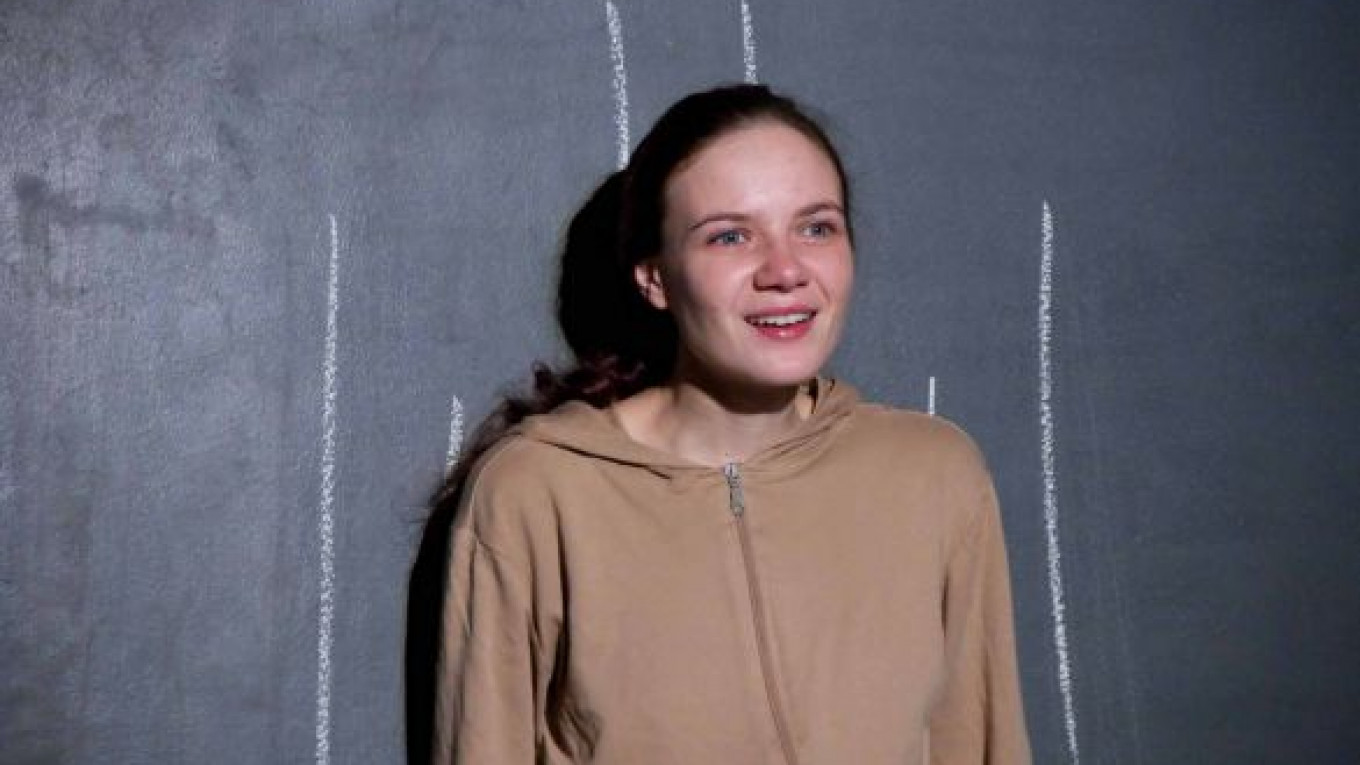It’s a cliche that all you need to make theater is an actor and a chair.
But even that cliche gets trumped in Yaroslava Pulinovich’s “Natasha’s Dream” at the Meyerhold Center.
Aside from the text and the actor, this entire show consists of an empty room, a comb, a hairpin, some white chalk and one costume change that takes place on stage.
There is no chair to be seen. And who needs one when you have a marvelously nuanced actress like Yelena Gorina backed up by a director like Shamil Dyikanbayev, who knows that every gesture, every glance and every visual image can be worth its weight in gold?
Gorina performs in the small black box on the fourth floor of the Meyerhold Center. There is something almost homegrown about the event. And that works to the show’s advantage.
Spectators enter the tiny hall from the snack bar and grab whatever seats are left, lined up against a wall. A guy working the lights pretty much stands in the doorway. It looks more like an exam at a theater institute than it does a real production.
That, too, works to its advantage, in part because this show started out as a student work in the Meyerhold Center’s graduate program.
After all, “Natasha’s Dream,” one of the most resonant texts to have emerged in Russia over the last two or three years, is an incisive look at the complex life of one teenage girl. The play is set in an orphanage school, where the girl — Natasha — runs up against insensitive teachers, shifty classmates, a journalist who unwittingly wins her heart, and a couple of experiences that most likely will scar her life forever.
Gorina, from her first appearance huddled in a corner to her last as she stands before us broken but bold and accusatory, is an example of how an actor can inhabit a role to perfection.
As I followed the story of the tough orphan Natasha jumping out a window on a dare, falling for the journalist who wrote about the incident, and growing entangled in the dangerous world outside the orphanage walls, I noted that there was no distance between Pulinovich’s words and Gorina’s performance. She became one with them, as if each belonged to her own fevered mind.
Gorina has a way of speaking clearly even though she often mutters through pursed lips. She rarely raises her voice, giving us the impression — perhaps a false one — that she is quite in control. She stares at us darkly from beneath her eyebrows in a way that carries deep reproach.
And then there are those rare moments when she opens up and blesses us with the broad, happy smile of a girl who, at her age, should always be this happy.
Such moments of joy are the strongest as she reminisces about her mother, a prostitute who wrote her letters from prison and was murdered by her pimp.
Life, you see, is full of paradoxes.
Dyikanbayev’s direction might seem nonexistent to the casual observer. But his hand is felt every step of the way — in the long early pauses, in Gorina’s animal-like runs from corner to corner of the empty space, and in that extraordinary moment of crisis when the actress puts a huge stick of hard white chalk in her mouth and eats it out of complete and total despair.
The sounds of that chalk crunching between her teeth as white powder cascades out between her lips just might comprise one of the most bracing and visceral images of anguish I will see this season.
Pulinovich’s text, written when she herself was a teenager, is deceptively simple. Much more than a picture of teenage angst, it is a stinging rebuke to an insensitive society. It is a portrait in pastels — with a few strokes of dark, bloody red — of youthful dreams being offered up as a sacrifice to “the way of the world.”
Furthermore, as Gorina and Dyikanbayev show here, it is a remarkably theatrical piece of writing. I know this play well, and yet I found myself hanging on its every word as though it was unfolding before me for the very first time.
And that last moment when the actress puts the audience on spot is powerful, indeed. You’ll have to see the show to find out what that means.
“Natasha’s Dream” (Natashina Mechta) plays Thurs., Feb. 24 and 26 at 7:30 p.m. at the Meyerhold Center, located at 23 Novoslobodskaya Ulitsa. Metro Mendeleyevskaya. Admission is free, but you must call and put your name on the invitation list. Tel. 363-1079, www.meyerhold.ru. Running time: 1 hour, 20 minutes.
A Message from The Moscow Times:
Dear readers,
We are facing unprecedented challenges. Russia's Prosecutor General's Office has designated The Moscow Times as an "undesirable" organization, criminalizing our work and putting our staff at risk of prosecution. This follows our earlier unjust labeling as a "foreign agent."
These actions are direct attempts to silence independent journalism in Russia. The authorities claim our work "discredits the decisions of the Russian leadership." We see things differently: we strive to provide accurate, unbiased reporting on Russia.
We, the journalists of The Moscow Times, refuse to be silenced. But to continue our work, we need your help.
Your support, no matter how small, makes a world of difference. If you can, please support us monthly starting from just $2. It's quick to set up, and every contribution makes a significant impact.
By supporting The Moscow Times, you're defending open, independent journalism in the face of repression. Thank you for standing with us.
Remind me later.







